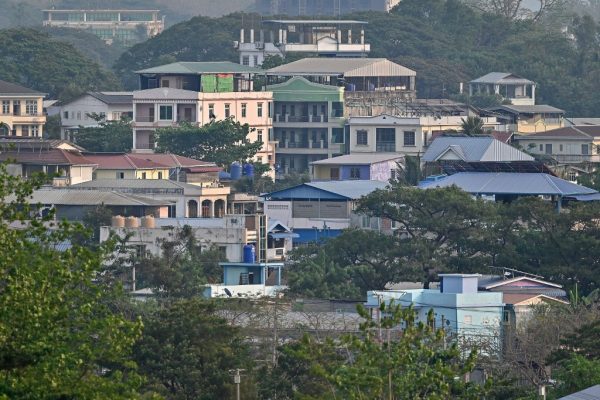New hurdles await in Thailand’s tortuous road to charter change

The government-sponsored draft bill for a referendum on charter change is hanging in the balance after lawmakers were forced to postpone their vote when a significant point in the draft was changed last week.
This delay is another setback in the push for changes to a junta-era Constitution that opponents say was written to extend the military’s grip on power.
The proposed referendum bill, which would ask the public for permission to write a new Constitution or to amend the current charter chapter by chapter, is set to return to Parliament for its second and third readings as well as final vote on April 7-8.
Why the delay?
The delay comes after Parliament voted on March 18 in favour of an opposition proposal to revise Article 9 of the referendum draft bill – a rare result in a Parliament where government MPs and senators enjoy a strong majority.
Parliament voted 273:267 in favour of the proposal by Chusak Sirinil, a scrutinising committee member from the opposition Pheu Thai Party, during the second reading to authorise Parliament and civil networks to request a referendum from the Cabinet. The proposal gained cross-party support from lawmakers, who said it would increase public participation.
However, some senators asked for a revote given the close margin of six votes, but their request was dismissed.
Initially, Article 9 contained two conditions for a referendum to be held:
First, if there are reasonable grounds, the Cabinet may call for a referendum on any matter apart from issues prohibited by Article 166 of the current charter.
Second, a referendum must be held where charter amendment is concerned. Among charter amendments requiring a referendum are changes to Chapter 1 (general provisions), Chapter 2 (the monarchy), and Chapter 15 dealing with constitutional amendments including Article 256.
A referendum is also required for changes to provisions covering powers of members of agencies, such as a section allowing senators to join MPs in voting for a PM.
The change to Article 9 forced revisions to at least four other related Articles in the draft bill. Hence, the committees asked for the final reading to be postponed so they could review the content before the draft returns to Parliament.
How protest leader ‘Penguin’ continues ruffling feathers
The tubby 23-year-old Thammasat University student has even managed to make headlines from behind bars, where he is being detained on lese majeste and other serious charges. The student protest leader has been in the limelight ever since he was first arrested on August 14, 2020.
House dissolution?
Revision of the Article prompted fears the bill may be shot down in the third reading which could trigger calls for the government to take responsibility by either stepping down, dissolving the House or a launching a court review.
Senator Wanchai Sornsiri, as spokesman of the scrutinising committee, said he personally believes the revised Article 9 authorising Parliament and public networks to ask the Cabinet for a referendum went beyond the framework allowed under the Constitution and the stated principle of the bill.
He added that the Constitution stipulates that only the Cabinet has the authority to call a referendum.
“If all stakeholders fail to reach agreement, the bill may be shot down – a historical repeat of the charter amendment draft that was voted down last week,” he said.
“The referendum bill is a ticking time bomb because it is key legislation proposed by the Cabinet. If it fails to pass, the government must dissolve the House in line with political protocol.”
However, if it passes the third reading, some lawmakers may seek a court ruling on the bill, he added.
Senator Kamnoon Sidhisamarn is convinced the bill will find it tough to pass the third reading because, he claims, the revised Article violates the current charter.
However, Chusak insists his proposal is not unconstitutional as it allows the Cabinet to have the final say on whether a referendum is held or not.
The government will now likely propose an amendment draft bill to revoke the power handed to Parliament and civic groups, a source quoted Deputy Prime Minister Wissanu Krea-ngam as saying in a Cabinet meeting on Tuesday.
Why was the bill issued?
The current Constitution requires a national referendum be held to ensure public participation in amending the charter.
While the 2017 charter stipulates a referendum is needed for certain charter changes, a recent Constitutional Court ruling said a national vote was also necessary on any move to rewrite the entire charter. The court ruled that Parliament had the duty and authority to draw up a new constitution, but two referenda must be held — first to ask whether people want a new charter and second for people to endorse the finished charter draft.
Observers say delaying the referendum bill will interrupt the push for changes to the junta-sponsored Constitution.
Yuthaporn Issarachai, a political scientist from Sukhothai Thammathirat Open University, supports empowering civic groups to request a referendum, a move he said paves the way for charter change written and initiated by the people.
He said it would be a pity if the bill was shot down in a power struggle between appointed senators and elected MPs.
“The fate of the bill is uncertain, as are hopes of seeing a new charter written. If the bill fails to pass, the country will have wasted a chance to write a new charter or even amend the current one,” he added.
Referendum probably best way to do it
The referendum that endorsed the present Constitution in 2016 may be controversial, but the one that would re-affirm or question its worthiness will be far less so. The former referendum took place when Thailand was under a full-scale military rule, as opposed to the current situation, when the country is a lot freer, has gone through inside-and-out debate on key national issues, and very much needs peaceful arbitration to guard against lurking violence.
Stumbling block for referendum
Observers believe the bill sets a high hurdle that may prevent a successful referendum. Article 13 of the bill requires a voter turnout of at least 50 per cent and a simple majority to achieve a viable result.
“It needs a huge number of voters to get involved or it will be invalid. This will be difficult to implement,” Yuthaporn pointed out.
Currently, the country has around 46 million eligible voters, so at least 23 million must turn out and more than 11.5 million votes would be needed to pass a referendum, he added.
Thailand held national referendums twice, in 2007 and 2016, on Constitution draft bills written by junta-backed agencies following coups. The turnout was 57.61 per cent and 59.40 per cent respectively.
By Thai PBS World’s Political Desk






